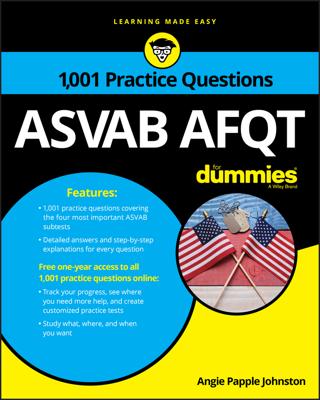You can’t actually “fail” the AFQT, but you can fail to achieve a high enough score to enlist in the service you want. If your AFQT score is too low, you need to work on one of four areas: math knowledge, arithmetic reasoning, reading comprehension, and word knowledge. These are the four subtests that are used to calculate your AFQT score. When you’re ready, you can apply for a retest.
ASVAB tests are valid for two years as long as you aren’t in the military. In most cases, after you join the military, your ASVAB scores remain valid as long as you’re in. In other words, except in a few cases, you can use your enlistment ASVAB scores to qualify for retraining years later.
After you take an initial ASVAB test (taking the ASVAB in high school doesn’t count), you can retake the test after 30 days. After the retest, you must wait at least six months before taking the ASVAB again. There’s no lifetime limit on how many times you can retest as long as you still meet the other requirements and a recruiter is still willing to work with you.
When you retake the ASVAB, the score on your most recent test is what counts. If you score lower on the retest, that’s the score that’s used for your military enlistment.
The bad news is that you can’t retake the ASVAB on a whim or whenever you feel like it. Each of the services has its own rules.
Army
The Army allows a retest only if
Your previous ASVAB test has expired. Test scores are valid for two years.
You failed to achieve an AFQT score high enough to qualify for enlistment.
Unusual circumstances occur. For example, if you’re called away from the test because of an emergency, you can retake the test.
Army recruiters aren’t allowed to schedule a retest for the sole purpose of increasing scores so you can qualify for enlistment incentives, job qualifications, or other special enlistment programs.
Air Force
The Air Force doesn’t allow you to retest after you’ve enlisted in the Delayed Entry Program (DEP). Current policy allows retesting of applicants who aren’t in the DEP, but already have a qualifying AFQT score. Retesting is authorized when the applicant’s current line scores limit the ability to match an Air Force skill with his qualifications.
These days, you can’t just take the ASVAB and a medical examination and head straight out to basic training. You have to wait your turn. The military has only so many basic training slots each month, and it has to reserve a slot for you (often several months in the future).
To ensure your commitment, the services enlist you in the DEP. Under this program, you’re enlisted in the inactive reserves while waiting for your basic training date to arrive.
Navy
The Navy allows you to retake the test if your previous ASVAB test has expired or you’ve failed to achieve a qualifying AFQT score for enlistment in the Navy.
In most cases, individuals in the DEP can’t retest. One notable exception is the Navy’s DEP Enrichment Program. This program provides for the provisional DEP enlistment of high-school diploma graduates with AFQT scores between 28 and 30. Individuals enlisted under the program are enrolled in academic enhancement training, retested with the ASVAB, and accessed onto active duty as long as they score 31 or higher on the subsequent ASVAB retest.
Marine Corps
The Marine Corps will authorize a retest if your previous test is expired. Otherwise, recruiters can request a retest as long as the initial scores don’t appear to reflect your true capability (considering your education, training, and experience).
Additionally, the retest can’t be requested solely because your initial test scores didn’t meet the standards prescribed for specific military job qualification.
Coast Guard
For Coast Guard enlistments, six months must elapse since your last test before you may retest for the sole purpose of raising scores to qualify for a particular enlistment option. The Coast Guard Recruiting Center may authorize retesting after 30 days have passed from an initial ASVAB test if substantial reason exists to believe that your initial AFQT score or subtest scores don’t reflect your education, training, or experience.

